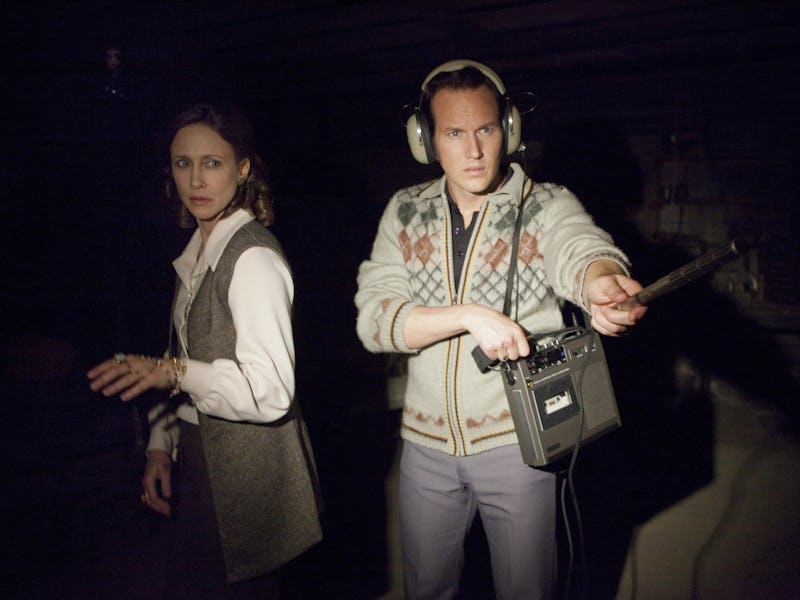You need to watch the scariest exorcism movie on Netflix before it leaves next week
The Conjuring Universe is one of the most successful horror movie franchises of all time. It all started in 2013, with The Conjuring by director James Wan.

Last week, when Warner Bros. Discovery CEO David Zaslav hyped his company’s portfolio, he spotlighted the DC superheroes and the immensely popular 90 Day Fiancé. But there was a glaring two billion dollar omission: The Conjuring franchise.
Chalk it up to a bias against horror movies, or maybe the new regime not wanting to tout a series of dark, R-rated movies to investors. But the Conjuring films, centered around real-life figures Ed and Lorraine Warren and their 50-ish years of investigations into alleged demonic possessions, constitute the most successful horror franchise of the 21st century. The premise affords an expansive continuity that rivals comic books in scale and flexibility.
The controversial personal lives of the Warrens — played by actors Patrick Wilson and Vera Farmiga — are darker than anything in these movies. But grimy details haven’t derailed the Conjuring train; a direct sequel to 2018’s The Nun is in production, and as recently as May 2021, there was talk of a Conjuring television series on HBO Max (although that was before Zaslav, who’s been bullish about de-emphasizing streaming, took the helm).
Regardless of how the Conjuring Universe evolves, it’s worth looking back at how it successfully launched before the franchise’s first movie leaves Netflix on August 20.
In July 2013, The Conjuring grossed a monstrous $319 million worldwide against a modest $20 million production. A handsome, almost naturalistic haunted house movie, The Conjuring isn’t complicated or inventive. Technically, creatively, and philosophically, it’s old school. Even critics in 2013 noted what a throwback it was. But thanks to the artistry of Saw director James Wan, it’s still one of the most impressive and unnerving movies ever made.
It’s how The Conjuring harnesses atmosphere and environment instead of relying on spectacle that makes the other movies in the series pale in comparison. With a close and left-of-center shot of disfigured doll Annabelle, The Conjuring lets us know we’re in hostile territory. Not long after, at a college lecture in 1971, we meet the handsome Warrens. Their clean appearances and academic posture betray the unbelievable nature of their work. When a student asks what their titles are, Ed replies, “We’ve been called demonologists. Ghost hunters, paranormal researchers...”
“Kooks,” adds Lorraine, breaking the tension and acknowledging skepticism in one swoop. “But we prefer to be known simply as Ed and Lorraine Warren.”
The Conjuring was a mega-hit that spawned a franchise. The movies center around Ed and Lorraine Warren (Patrick Wilson and Vera Farmiga), depicted as a charming couple of paranormal investigators.
An ominous fade to creepy yellow-on-black text clarifies their unique traits; Lorraine is clairvoyant, while Ed is “the only non-ordained Demonologist recognized by the Catholic Church” (a claim that’s disputed). As horror movies go, you couldn’t dream of a more efficient introduction. It’s little wonder more movies spawned around these characters; they’re easy to drop into countless spooky scenarios.
Efficiency really is The Conjuring’s strong suit, as James Wan drops the Warrens into the case of a family suffering a demonic infestation in their idyllic rural Rhode Island home. Wan made his mark with the surprise hit Saw, which made the “torture porn” subgenre the approach to horror in the post-9/11 years. After two 2007 duds, Dead Silence and Death Sentence, Wan bounced back in 2010 with Insidious, his first collaboration with Patrick Wilson.
A departure from the gore that started Wan’s career, Insidious proved he had the instincts to create tension and atmosphere. The Conjuring sees Wan really find his groove in a movie replete with Insidious’s unique touches, including sneaking effective jump scares into conventional shots and editing techniques.
But in contrast to Insidious, The Conjuring makes excellent use of negative space. When’s the last time you were so afraid of shadows behind a bedroom door? The simple instance of something happening when and where it’s not supposed to — a ball thrown in a basement, clapping hands from the shadows — can generate more screams than anything that’s actually scary.
Lili Taylor co-stars as Carolyn Perron, a mother whose new Rhode Island home is haunted by an evil entity.
Released a year after The Avengers alerted the rest of Hollywood to the gold rush of cinematic universes, The Conjuring stumbled backward into its fortune. The original movie was followed by 2014’s Annabelle, directed by The Conjuring cinematographer John R. Leonetti and greenlit after audiences were enamored by the Annabelle doll and its (exaggerated) mystique. Despite a critical drubbing, Annabelle grossed enough to prove to Warner Bros. that its new big franchise is the many stories of the Warrens, factual accuracy be damned.
Like all successful cinematic universes, The Conjuring never set out to launch a franchise. It just happened. And sure, the other movies in the Conjurverse can’t hold a candle to the 2013 original, with the franchise falling over its own feet with colorless clichés and visual maximalism that betrays what made the original so engrossing.
But the years have only been kind to The Conjuring. It’s far more fun to enjoy in hindsight, and divorced from the sequels and spin-offs that are haunted by it.
The Conjuring is streaming on Netflix until August 20.
This article was originally published on